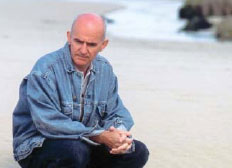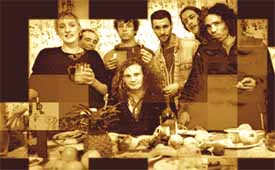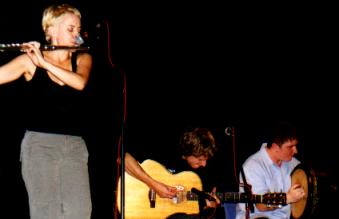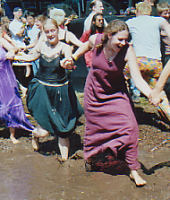| ++ John Tams ++ Tony Trischka ++ Dan Ar Braz ++ William Zantzinger ++ Davy Graham ++ Odetta ++ Miriam Makeba ++ John Pearse ++ Liet-Lavlut Songcontest ++ Irish Music Stamps ++ Kila ++ Flook ++ Up and Coming: folkBALTICA, TFF.Rudolstadt, Folkwoods, Tonder ... ++ |
FolkWorld Reviews John Tams, * 16.02.1949, England. John Tams is a highly regarded English theatrical and television actor, musician and and singer/songwriter. In the 1970s he went to the west of Ireland to make field recordings of concertina players for the Free Reed label, only recently reissued. John Tams was a member of Derbyshire's folk group Muckram Wakes and worked with Ashley Hutchings as a singer and melodeon player. He released three solo albums, and became a five times winner of the BBC Radio 2 Folk Awards, including Folk Singer of the Year and twice Album of the Year. At the 2008 Awards he and his singing partner Barry Coope (of Coope Boyes and Simpson -> FW #20) were presented with the Best Duo award. Three years ago, John Tams had been musical director of the critically acclaimed six-part new Radio Ballads series (-> FW #37).
FolkWorld Reviews Tony Trischka, * 16.01.1949, Syracuse, New York, USA. Tony Trischka is one of the most influential five-string banjo players who has inspired a generation of bluegrass and acoustic musicians. He graduated from Syracuse University with a B.A in Fine Arts, and was himself inspired to play the banjo by listening to the Kingston Trio in 1963. In 1971 he made his recording debut with 15 bluegrass instrumentals. Since then he recorded numerous solo and band albums. In 2007 Tony Trischka won three International Bluegrass Music Awards (IBMA) for "Double Banjo Bluegrass Spectacular," featuring Earl Scruggs and many others: Instrumental Album of the Year, Recorded Event of the Year, and Banjo Player of the Year. His latest release on Smithsonian Folkways, "Territory" , explores a wide range of banjo traditions, sounds and tunings. Besides his solo tracks, he partners with fellow banjoists Pete Seeger, Mike Seeger, Bill Evans, Bill Keith, and Bruce Molsky.

en.wikipedia.org/wiki/Dan_Ar_Braz Dan Ar Braz, * 15.01.1949, Quimper, Brittany, France. In 1967, Dan Ar Braz (Daniel Le Bras) was asked to join harpist and singer Alan Stivell with his electric guitar. In 1972 he formed his first own group. Dan Ar Braz recorded Celtic and self-penned instrumental music, he sang in French and English, and he joined the British folk rock pioneers Fairport Convention and a blues rock trio. Dan Ar Braz had his moment of glory when asked by the Festival de Cornouaille in Quimper in 1992 to create a live show uniting traditional Breton music with modern styles. He invited 75 musicians altogether, including Donal Lunny, Karen Matheson, Elaine Morgan, Bagad Kemper and Alan Stivell. The group, called "L'Héritage des Celtes," recorded three successful albums, and even represented France in the 41st Eurovision Song Contest in 1996.
William Zanzinger killed poor Hattie Carroll
With a cane that he twirled around his diamond ring finger...But you who philosophize disgrace
And criticize all fears,
Take the rag away from your face.
Now ain’t the time for your tears.wikipedia.org/wiki/The_Lonesome_Death_of_Hattie_Carroll William Zantzinger (1939-2009). The wealthy tobacco farmer from Charles County, Maryland, whose fatal beating of a black barmaid inspired a Bob Dylan song, died on January 3rd, 2009. In February 1963, William Zantzinger beat Hattie Carroll, a 51 year old Afro-American woman, with a cane for taking too long to serve him a drink. Hattie Carroll later died from a brain haemorrhage. Zantzinger was convicted of manslaughter and assault and sentenced to six months' imprisonment. After serving his sentence, Zantzinger went into renting ramshackle dwellings to black workers. In 1986, Charles County confiscated all his properties because of failure to pay taxes. Nevertheless, Zantzinger continued to collect rent and was eventually fined and sentenced to 18 months.
In The Lonesome Death of Hattie Carroll, Bob Dylan criticized different standards of justice meted out to whites and blacks. He recorded the song on October 23, 1963, and it was released on his 1964's The Times They Are A-Changin album. Dylan continued to perform it in concert until recently. The song has also been recorded by artists such as Martin Carthy and Christy Moore. Billy Bragg used the tune for his own The Lonesome Death of Rachel Corrie, commemorating an activist who was killed in the Gaza Strip by an Israeli bulldozer.
Meanwhile, Bob Dylan licensed his song Blowin' in the Wind to be used in an advertisement for the British consumer-owned Co-Operative Group. The Co-Op claimed that Dylan's decision was influenced by "the Co-Op's high ethical guidelines regarding fair trade and the environment." The song has been written and released on the 1963 album The Freewheelin' Bob Dylan, the melody adapted from the old spiritual No More Auction Block. The song became one of the most popular anti-war songs during the 1960s. Although it has been described as a protest song, it only poses a series of philosophical questions about peace, war, and freedom without supplying any answers: "The answer, my friend, is blowin' in the wind ..."

www.davygraham.comDavy Graham (1940-2008). English guitarist and singer Davy Graham has passed away on 15 December 2008 after a short battle with lung cancer. David Michael Gordon Graham, known as Davey or Davy Graham, had been born in Hinckley, Leicestershire, to a Guyanaese mother and a Scottish father. From the early 1960s on, he inspired many practitioners of the fingerstyle acoustic guitar, including Bert Jansch, John Renbourn and Martin Carthy. Davy Graham composed the signature tune of the British folk revival, "Anji," and invented the modal tuning system known as DADGAD, since then a second standard tuning for guitar players. He released a string of eclectic records covering different styles and genres. His latest album, "Broken Biscuits," consisted of original music and arrangements of traditional songs from all over the world.
en.wikipedia.org/wiki/Odetta Odetta (1930-2008). African-American singer Odetta died on 2 December 2008 in New York City. Odetta Holmes was born in Birmingham, Alabama, and grew up in Los Angeles, California. In 1950 she joined the touring company of the musical "Finian's Rainbow". "A nice exercise," Odetta said, "but it had nothing to do with my life." She fell for blues, jazz and folk music and influenced generations of performers, including Joan Baez, Janis Joplin and Harry Belafonte. Bob Dylan said, "The first thing that turned me on to folk singing was Odetta. I heard 'Odetta Sings Ballads and Blues' [1956] in a record store. Right then and there, I went out and traded my electric guitar and amplifier for an acoustical guitar." In 1963 Odetta marched alongside Martin Luther King at the civil rights movement's march to Washington where she sang "O Freedom." In 1999 US President Bill Clinton presented Odetta with the National Endowment for the Arts' National Medal of Arts. She had hoped to perform at Barack Obama's inauguration in January 2009.
www.miriammakeba.co.za Miriam Makeba (1932-2008). South African singer Miriam Makeba, also known as Mama Afrika, died in Castel Volturno, Italy, on 9 November 2008, of a heart attack, shortly after taking part in a concert organized to support writer Roberto Saviano in his stand against the Camorra organisation. Miriam Makeba was born in Johannesburg in 1932. Her professional music career began in the 1950s, singing a blend of jazz and traditional melodies of South Africa. Her break came when she starred in the anti-Apartheid documentary "Come Back, Africa" in 1959. Harry Belafonte assisted her in gaining entry to and fame in the United States. She released many of her most famous hits there including "Pata Pata." In 1966, Makeba received the Grammy Award for Best Folk Recording together with Harry Belafonte for "An Evening With Belafonte/Makeba." The album dealt with the Apartheid; only in 1990 Nelson Mandela persuaded her to return to South Africa.
www.johnpearse.com
www.jpstrings.comJohn Pearse (1939-2008). Sir John Melville Pearse - performer, entrepreneur, inventor, raconteur, author, teacher, bard, jolly good fellow - was an English guitarist and folk singer. He had been a spell-binding player of the Piedmont blues style, characterized by a finger-picked, syncopated melody against a regular bass provided by the thumb. which he had learned from Big Bill Broonzy in 1957. Pearse refined it over the years, adding elements from Jazz and other genres, and presented the first ever series of televised guitar lessons for the BBC in 1965, "Hold Down a Chord." He worked as a record producer and designed products for Martin Guitars, before founding Breezy Ridge Instruments and marketing his own line of guitar strings. In 1983 he suffered a cataclysmic accident that paralysed him from the neck down. He determined that he would play guitar again and eventually he performed again, without being able to feel the fingerboard. John Pearse passed away peacefully on 31 October 2009 in Southern Germany, where he have lived for the past several years.
|
www.culioli.net 1. Jacques Culioli, Corsica
|
Jacques Culioli from Corsica won both the public award and the jury award at the fifth edition of Liet Ynternasjonaal - Liet Lavlut, the songcontest for minority languages. The Asturian rockband Dixebra and Sami singer Elin Kåven ended both ex aequo second after Culioli. Culioli, a traditional singer from the village of Chera in the south of Corsica, impressed both audience and jury with his moving song "Hosannah in Excelsis." The song was written as a prayer for the future of an united and Corsican Corsica after the dark period during which Corsican nationalists fought against each other.
Culioli managed to get this message across as far north as Lulea in the north of Sweden. The fifth edition of Liet Ynternasjonaal - Liet Lavlut was held in a packed Kulturens Hus. The contest was broadcast live on radio in Scandinavia and Galicia in Northwest Spain. Immediately after the contest the audience was enabled to vote through sms or the internet. Here Culioli also won, closely followed by the Breton singer Gwennyn and the Meankieli tango group Surunmaa.
|
|
An Post and Correos de Espana launched the first joint stamp issue between Ireland and Spain celebrating popular dances from both countries. The 55c Irish stamp features an illustration of an Irish dancer. The 82c Spanish design is based on a photograph of a flamenco dancer.
Irish dancing was revived at the end of the 19th century as part of the Celtic Renaissance. The Irish Dancing Commission was set up in 1929, establishing rules for dance competitions and standardising methods of teaching. Riverdance and similar shows have pushed Irish dancing to the forefront of worldwide attention in recent years.
The Spanish Gypsy tradition is widely credited with helping flamenco to spread, survive and flourish. Through the 18th and 19th centuries, flamenco was performed in café and theatre danced by professional artistes. By the 1950s commercialisation came close to debasing the entire genre. Helped by the flamenco festivals of the 1960’s and 80’s a revival of interest in flamenco as an art form developed.
An Post has also launched the second phase of their Irish Music stamp series celebrating the phenomenon and the legacy of Irish traditional music. Four of Irelands’ most renowned and best loved groups are captured at the height of the trad boom during the 1970s.
Planxty (55c stamp) began playing in the early 70’s and became an immediate success at home, in the UK and Europe. Planxty revitalised the Irish music scene with a set of folk and traditional songs and tunes performed with an unusual line-up of instruments that included bouzouki, mandolin and guitars with uileann pipes, bodhrán and tin whistle. Andy Irvine said “Stamp collecting was my childhood hobby. Little did I think that, one day, I might become a collectible myself!”
De Dannan (55c stamp) formed in 1974 and took their name from the Tuatha De Dannan, a mythical Irish Tribe. De Dannan trademarks include their rhythmic sound and a great willingness to experiment, demonstrated in recordings of the Beatles, Handel and Queen. The band is one of the most influential bands in Irish traditional music and while the vocalists with De Dannan have frequently changed they read like a Who’s Who of Irish music. De Dannan musician Charlie Piggott said "Having contributed to the promotion of Traditional Irish Music and as a keen philatelist, I consider it both an honour and a privilege to be celebrated on an Irish stamp."
The Bothy Band (82c stamp), or the Bothies, also first got together in 1974 debuting at Trinity College Dublin in 1975. The band was noted for the musicians’ highly energetic live performances including fiddle, pipes and flute. Their fire and talent has long outlasted the group’s brief and brilliant history.
The Tulla Céilí Band (82c stamp) was formed in 1946 from a group in east Clare taking part in that year’s Limerick Fleadh. Still going strong today, the band is now together for over 60 years and has undergone many changes of personnel in this time. Their superb music and individual style features traditional céilí rhythms played with a lively swing and continues to win fans in Ireland and abroad.
In 2006 An Post issued the first in the series of Irish Music stamps featuring The Clancy Brothers and Tommy Makem, The Dubliners, The Chieftains and Altan.

|
Over ten years ago Irish music band Kíla were approached by a group of animators who had a vision of creating a feature length film about the book of Kells. Hugely impressed by the artwork they saw and the guys vision and enthusiasm Kíla gladly lent them their music for various pilot versions for gathering funding. After much hard work, trips around Europe gathering funds and partners and years of colouring in!; The Secret of Kells will be premiered as the closing film at this years Dublin Film Festival. Featuring Kíla's music along side world renowned French film composer Bruno Coulais this is a stunning animation and great story. It will go on general release in March.Check out ie.youtube.com/watch?v=DNjWGoxcCEY for trailer!

|
After 13 plus years, hundreds of gigs, millions of miles travelled together and countless brilliant times, we've decided to call it a day.It might be forever or a prolonged pause, who knows, but we're all still great friends and will always remain so. This might sound like a cliché but it is deeply truthful.
Huge thanks to every single one of you for your support and love, we'll certainly miss making music as Flook, but the light, notes and memories shine on in our hearts.
We'll keep you informed of any important info in the future, for now our love and best wishes for 2009 and beyond.
Sarah, Brian, Ed & John Joe
FROG Festival Listing |
![]() 22-28 Apr 2009 - folkBALTICA
22-28 Apr 2009 - folkBALTICA
Flensburg & Sønderjylland-Schleswig, Germany;
ft. focus on Denmark
www.folkbaltica.de

![]() 3-5 Jul 2009 - TFF.RUDOLSTADT
3-5 Jul 2009 - TFF.RUDOLSTADT
Rudolstadt, Germany;
ft. focus on Russia, the Lute, and Lower Saxony/Bremen
www.tff-rudolstadt.de
![]() 14-16 Aug 2009 - FOLKWOODS FESTIVAL
14-16 Aug 2009 - FOLKWOODS FESTIVAL
Eindhoven, Netherlands
www.folkwoods.nl
![]() 27-30 Aug 2009 - TØNDER FESTIVAL
27-30 Aug 2009 - TØNDER FESTIVAL
Tønder, Denmark
www.tf.dk
